Contents
- Poll: 85% of Remote Workers Are Unhappy with Their Pay
- 3 Money Lessons for Financially Focused Remote Workers
- #1: Work For Global Pay Not Local Rates
- #2: Always Leave Jobs You’re Overqualified For
- #3: Replace Hyper-specialization with Skill Stacking
- 15% of Remote Workers are Proud of What They Earn
What do the highest paid remote workers do differently? It’s easy to work hard and do well in your tech career – it’s much harder to become one of the few people who have figured out how to earn BIG while working from anywhere. If you want to finally be a part of this elite group, these invaluable tips offer you a shortcut.
Conventional wisdom tells us that if we lean into the grind, and do impressive things at work we’ll be rewarded. Put your head down, deliver value, juggle more, more, more. Ha!
That’s a total lie.
Because omitting essential information is the SAME as lying.
Most people want to get ahead, but they never will - they don’t know how!
So, I’m giving you 5 powerful insider secrets that I’ve personally learned about what the highest paid remote workers do differently that keeps them focused on the money.
This is how you will future proof your pay – by being better, doing better and earning more.
Time for a financial health check.
Poll: 85% of Remote Workers Are Unhappy with Their Pay
Like many remote workers before me, I spent my twenties working myself into oblivion, while always at the mercy of shark infested job boards.
When you don’t know where your next paycheck is coming from, your habits can quickly turn against you and your decision-making skills go to hell in a handbag.
Operating from a place of fear and stress is a literal nightmare.
Worse still, it’s a hole you keep digging.
And there’s shame attached to it, which drives motivated people to push harder.
In a recent poll on LinkedIn, we asked our Crossover community of remote workers a simple question.
“If everyone’s pay at your company leaked tomorrow, how would you feel about yours?”
We had 14,964 tech folks respond with bleak results.
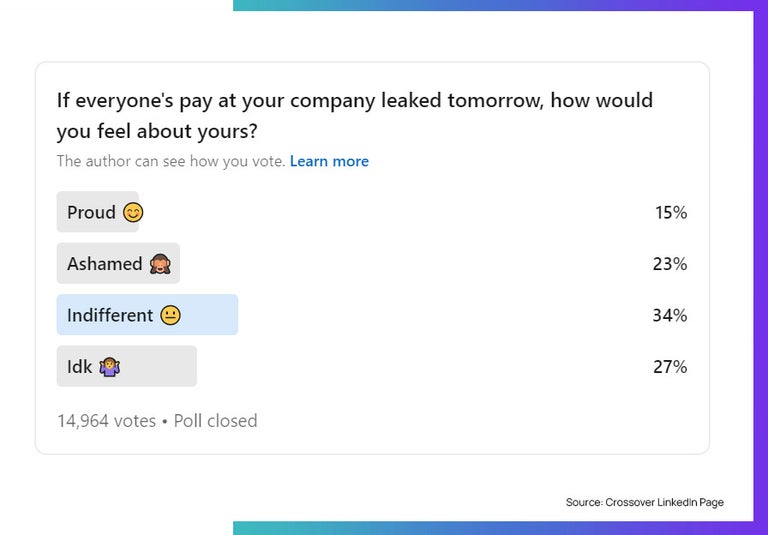
Some 85% of respondents felt ashamed (23%), indifferent (34%) or confused (27%) about their paycheck going public.
Yowza.
Everyone deserves to be proud of what they earn.
But when nothing you do improves your financial wellbeing – it’s 100% normal to feel inadequate, disappointed…and to stop caring altogether.
I’ve seen it happen time and time again.
Let’s not forget that the odds are stacked against you, especially when you live in a developing country (like me) where companies tend to do whatever they want.
They don’t care about you and that’s rough to process.
So how do some remote pros figure out how to sidestep these negative emotions brought on by disillusionment and earn MORE?
3 Money Lessons for Financially Focused Remote Workers
Being a high-income remote worker is quickly becoming the status symbol of our time.
Which begs the question: how do YOU become a HENRY?
HENRY’s are High Earners, who are Not Rich Yet. But in the fast-approaching future these are the individuals who are most likely to be the wealthy of tomorrow.
Check out what the remote rockstars at Crossover do with their money:
Here’s how they operate.
#1: Work For Global Pay Not Local Rates
Your value doesn’t decrease based on someone’s inability to see your worth.” – Zig Ziglar
The mindset: Local jobs are easier to get but they come with lower pay.
The challenge: Price yourself for the global market based on your skills.

Do you love working remotely? Then go all in.
When you work on a global scale, the full power of that is unleashed when you look beyond the roles available inside your country.
Global remote workers earn WAY more than local remote workers – because local companies pay local rates.
When you get an international role, you can earn in stronger and more stable currencies, and enjoy economic stability outside of local market volatility.
We checked on this by asking our community in a poll: “How Does Your Global Remote Pay Compare to Local Rates?”
With 8047 people weighing in, there was no question – 56% of remote workers earning global pay DID in fact make more money.
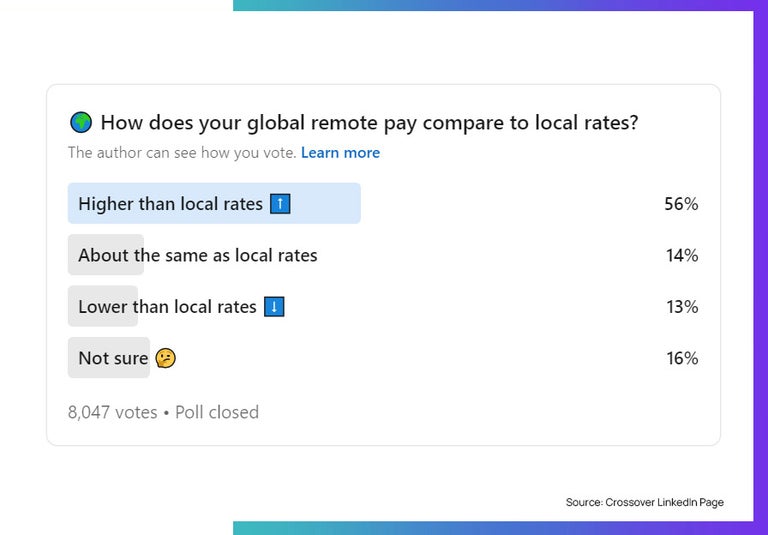
Health Check: Is your local remote job holding you back?
Time to quit the local pay racket and target global remote roles that match your skill set. Don’t wait for a raise that will never come. Switch to pursuing international employers that pay you what you’re worth.
Think globally – your skills are worth so much more than what you get paid at home.
#2: Always Leave Jobs You’re Overqualified For
"Don’t be afraid to give up the good to go for the great." - John D. Rockefeller
The mindset: I’m good at this job even though I’m not achieving my goals.
The challenge: Aim for roles that inspire growth so that your life expands with them.
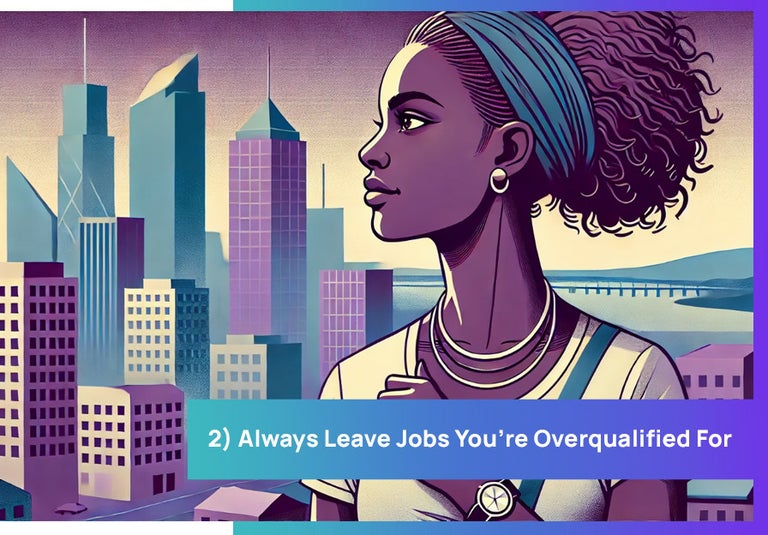
Ah comfort. There’s nothing better than the pure confidence that comes from doing something you know – without any doubt – that you can absolutely crush.
Of course, comfort zones will keep you poor.
Which, in retrospect, isn’t very comfortable at all. There’s a real emotional conflict here. On one hand, society tells us that being good at something is great. But it’s this twisted sentiment that is holding you back.
According to Judith Bardwick, the originator of the term ‘to leave your comfort zone’ – the danger is real. You’re working in a job in an ‘anxiety-neutral’ condition. You’ve capped your performance, you feel no risk.
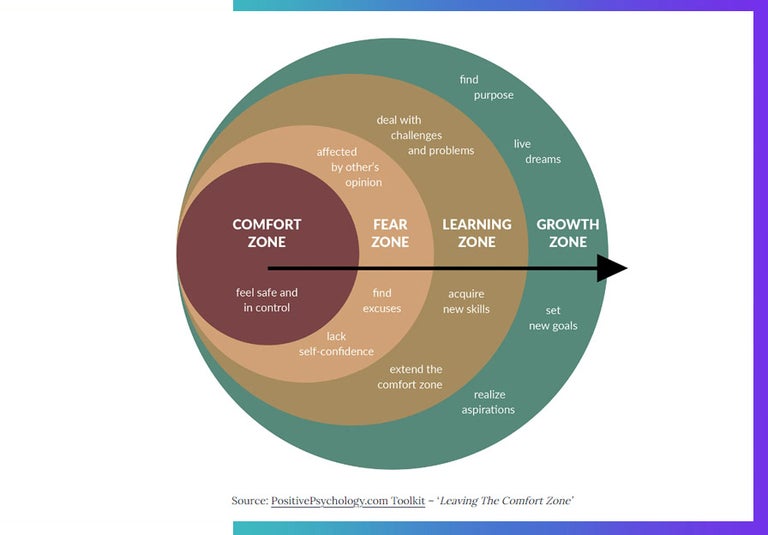
Newsflash! You’re violating a fundamental law of performance.
It’s called Yerkes and Dodson’s Law. It says that performance improves with increased stress, but only up to a point. There is an optimal level that must be reached (and not exceeded) balancing motivation and overwhelm for growth to happen.
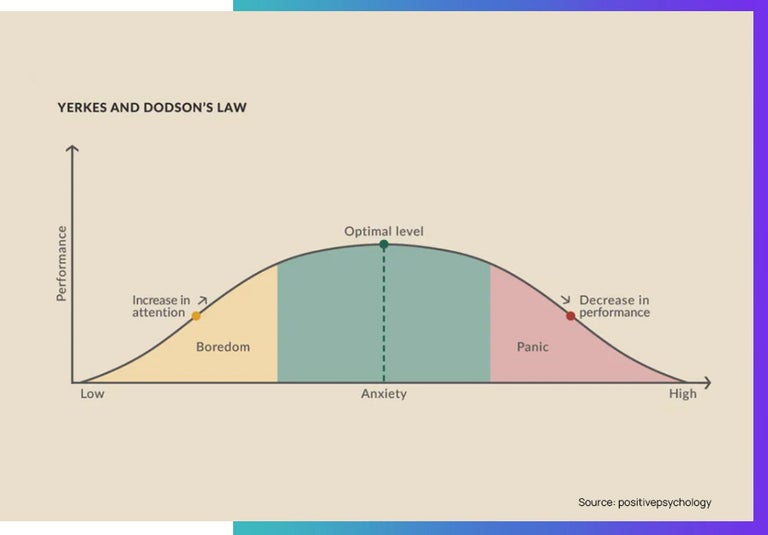
Staying in (or horror – applying for) a job you’re overqualified to do puts you in a state of functional freeze. You need to pursue ‘the great’ to find your way to financial fulfilment. So, you need to be in constant ‘fight’ mode to make career progress.
High performers become high earners because they live outside their comfort zone. The moment it creeps in, they leave.
Health Check: Have you outgrown your job? If your remote role is kind of boring, but in a safe, lovely way – you’re in extreme danger. Coasting isn’t growing. You work to earn, so stagnancy in your job means stagnancy in your bank account.
Your next role should challenge your limits, not your wallet.
#3: Replace Hyper-specialization with Skill Stacking
"Your greatest asset is your earning ability. Your greatest resource is your time." - Brian Tracy
The mindset: Stick to one thing then become the absolute best at it.
The challenge: Master your niche, then add complimentary skills to amplify your value.

It’s true - you can learn your way to more money.
But it’s not about expensive degrees, student loans or fancy diplomas. And it doesn’t mean buying into bad advice from 2010 and over-focusing on specializing early in your career. Skill-building is now the currency for HENRY’s everywhere.
It was journalist David Epstein who said that experts who have specialized can become so narrow minded that they actually get worse with experience and become overconfident in the abilities.
- Overconfidence kills curiosity and innovation
- It creates blinkers that prevent growth
- It shuts out new knowledge that keeps you stuck
You know what doesn’t? Skill stacking.
If your goal is to grow, innovate and earn more sooner – then it pays for you to adopt a multidisciplinary approach. Instead of hyper-specializing, dedicate time to building skills that complement your core skill.
Think of your career like cooking. Sure, it pays to perfect a single Italian dish, but it also limits your options. But if you learn to cook a variety of Italian dishes you can adapt to different tastes and needs.
Skill stacking is like having the ability to execute the entire menu, while still having your star dish. Ultimately it offers more value and versatility to everyone you serve.
And when a new ingredient comes along, you’ll use it.
So, as you work or search for a new job, prioritize finding a place that values skills, learning and carves out time for those essential functions.
A recent study found that remote workers spend 25% less time than office workers on career development. Don’t let that be you!
Health Check: Are you stuck in hyper-specialization mode? Look at your current skills and take action to diversify them. You need complimentary skillsets that increase your value as a remote worker – not pigeonhole you into a dead-end career.
Master one skill, then layer on more to become irreplaceable.
15% of Remote Workers are Proud of What They Earn
If you want to shift from being part of the 85% of remote workers who are unhappy with their pay, to the 15% who are proud of it – listen up.
Earning more money isn’t easy – but you CAN make it happen.
Instead of grinding yourself to dust, it pays to be smarter than that. The highest paid remote workers look beyond the daily slog and plan to earn more.
They focus on a simple formula that works.
Right place. Right motivation. Right skills.

Wrench yourself out of the mediocrity mindset!
When you do this and apply time – you get a compounding impact that skyrockets your pay. Conventional wisdom has let you down.
You won’t see HENRY’s scraping by in boring, dead-end local jobs watching as their lives (and future earning potential) circle the sink. They fight for what they deserve.
If you want to be a part of the 56% who earn more, do your financial health check.
- Are you targeting superior global remote roles that pay MORE?
- Are you being challenged in a job that activates optimized performance?
- Are you stacking your skills to future-proof your career?
HENRY’s don’t focus on layoffs, RTO mandates, economic instability or being unemployed.
They focus on what matters: Being better, doing better, and earning more.
If you’re not there yet, start now.









